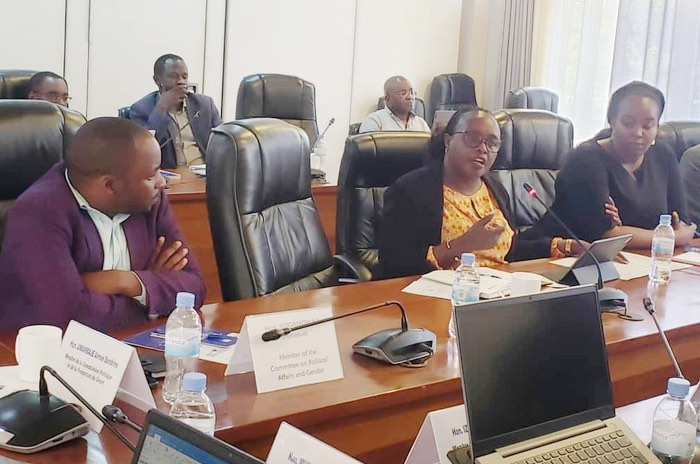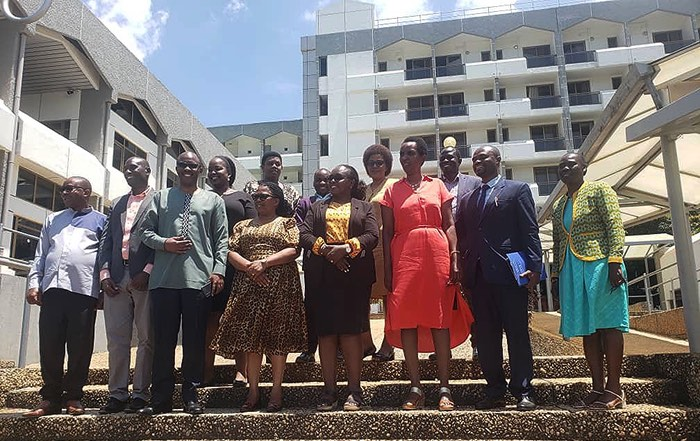
In Rwanda, as in most countries in the region, gendered norms perpetuate the expectation that women should be the primary care providers while men should be the primary breadwinners.
From cooking and cleaning to fetching water and firewood or taking care of children, the sick, and the elderly, women do at least two and a half times more unpaid household and care work than their male counterparts.
Maria Mukamusoni, a resident of Ntarama Sector in Bugesera District, is a living example of the burden of unpaid care work. Juggling farm duties with the care of her three children, her grandmother, and her bedridden stepfather, she represents the countless women in Rwanda who bear the brunt of this societal expectation.
Mukamusoni, 32, manages all household chores because her husband works in town and barely has time to be at home. She works for more than 15 hours a day.
Despite Rwanda’s strides in gender equality and women’s empowerment, the unequal distribution of unpaid care work (UCW) persists, hindering economic empowerment for women, particularly in rural areas.
Recognizing the need for change, Rwanda has initiated efforts to address the unequal distribution of unpaid care work. These include evidence-informed research conducted by the Rwanda Institute of Policy Analysis and Research (IPAR) and advocacy for policy uptake. These steps are crucial in paving the way for a more equitable distribution of care responsibilities.
IPAR, in collaboration with Réseau des Femmes Oeuvrant pour le Développement Rural and funded by Canada’s International Development Research Centre (IDRC), has taken significant steps to address the issue of unpaid care work. A comprehensive study was conducted, focusing on reducing and redistributing unpaid care work in five districts. This research serves as a crucial foundation for future policy changes.
Presenting the findings to Rwanda’s parliament, Eugenia Kayitesi, the Executive Director of IPAR, noted that the objective was to undertake a comprehensive legal analysis of gender compliance related to unpaid care work.
Unpaid care and domestic work, often overlooked, are significant contributors to Rwanda’s economy. They account for about 10 to 39 percent of the Gross Domestic Product, surpassing the contributions of the manufacturing, commerce, or transportation sectors. This underscores the economic value of unpaid care work and the urgent need to address its gendered distribution.
Although women make up the majority workforce in rural farms, where 70% of Rwandans live, they are heavily involved in UCW compared to their counterparts in urban areas, making them economically disadvantaged compared to men.

Eugenia Kayitesi, the Executive Director of the Rwanda Institute of Policy Analysis and Research (IPAR), presents findings to Parliamentary Committee.
“Efforts have been underway to make interventions aimed at reducing and redistributing unpaid care work, thereby improving quality of life and helping the disadvantaged,” Kayitesi told the Parliamentary Committee on Political Affairs and Gender.
IPAR is spearheading evidence-informed research and engagement for policy uptake along the continuum of policy implementation, where gaps have been identified. Critical action recommendations around education issues, youth unemployment, and skills development were suggested.
Furama Emma Rubagumya, Chairperson of the Parliamentary Committee, acknowledged the significance of IPAR’s work and emphasized the need for advocacy to reduce, recognize, and redistribute unpaid care work.
Ismael Byaruhanga, a Researcher Fellow at IPAR, says that; “despite recent gains in women’s empowerment and equality in Rwanda, gaps remain in implementing gender equality policies.
There is limited policy support for women’s economic empowerment. Many policies focus on increasing women’s and girls’ inclusion without addressing the underlying social norms that hold them back.
Member of Parliament Announciata Mukarugwiza observes significant potential for positive social transformation when everyone is actively engaged in the mission towards achieving gender equality.
Mukarugwiza urged the rectification of discriminatory social and cultural norms and beliefs that undermine women’s and girls’ potential. She emphasized that achieving gender equality in the household and society is no longer negotiable.
“We can no longer ignore the issues related to unpaid care work. We have to collectively revisit and address the predated structures, stereotypes, and cultural beliefs that bear norms that exclude and discriminate against women and girls, ultimately limiting their potential. We must aim towards positive social norms that can make us prosper. The power to change is in our hands; we need all hands-on deck, including men, boys, authorities, community leaders, and more. That is how we can do things differently and influence lasting change.” she emphasized.
Wives often depend on their husbands because of the cultural expectation that women do unpaid care work. At the same time, men are the economic providers, which makes women less likely to have remunerated employment than their husbands, although only minorities of both have off-farm employment.
Research presented showed that wives estimated that they do, on average, 63% of the UCW, their husbands do 25%, and another member of the household does 12%.
Byaruhanga notes that based on the findings, nearly 50% of wives and over 40% of husbands think there should be a gendered division of labour. This suggests that almost half of men and women do not believe women should have paid employment.
Women typically work more hours per week, averaging 75.6 hours, compared to men, who work 66.6 hours. Despite this, men often enjoy more leisure time, averaging 25.1 hours compared to 18.1 hours for women. Moreover, women dedicate significantly more time to unpaid care work, spending 35.2 hours compared to 14.3 hours for men.
Recognizing women as equal to men requires equal respect and representation in decision-making processes. This entails ensuring that women’s interests are given equal consideration alongside those of men (equal say).
Furthermore, achieving true gender equality necessitates redistributing opportunities and economic power.
Rwandan laws and policies remain relatively silent as far as domestic work is concerned. Though there is good policy and legal framework on gender equality, gender stereotypes, and negative masculinity still exist where women are still the majority affected by unpaid care work.
The 2016 law on persons and family publicly stipulated that both husband and wife should share responsibilities in household management.

Members of parliament from the Parliamentary Committee on Political Affairs and Gender gather for a group photo with researchers from the Rwanda Institute of Policy Analysis and Research at the parliamentary building in Kigali.
Valuing unpaid care work in divorce settlement cases
Proposed legislation in parliament wants to recognize the value of unpaid care work, particularly in divorce settlement cases. MPs emphasize that every hour a woman devotes to UCW represents a valuable contribution to her family.
If the bill passes, Rwanda will join a select group of countries worldwide that compensate spouses for unpaid care work in divorce settlements.
If the proposed new family bill successfully passes through parliament, the judge will have the authority to determine asset allocation based on various factors. This is in contrast to the existing law, which mandates equal division of property between both partners.
Jean Claude Bizimana, a local lawyer, explains that the recognition and valuing of care work, both paid and unpaid, is fundamental to achieving gender equality for women and girls.
“The recognition, reduction, and redistribution of unpaid care work are still affected by cultural norms, limited role models, limited availability of credible and representative data on unpaid care work and access to needed infrastructures in Rwanda needs to revise the silent (family) laws and policies on UCW,” says Bizimana.
“There is a need for advocacy by relevant players to ensure legal and policy reforms for UCW are in place,” He added.
The 3Rs (Reduce, Recognize, and Redistribute) program aims to address the demand for programmatic interventions targeting unpaid care and domestic work and overall time poverty.
